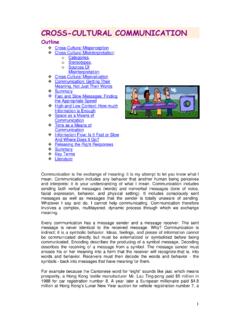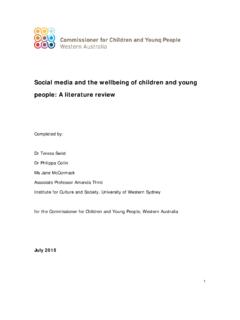Transcription of BENEFITS OF MINDFULNESS - University of Minnesota
1 BENEFITS OF. MINDFULNESS . A growing body of research evidence points to the numerous BENEFITS of MINDFULNESS practice. In essence, studies indi- cate that MINDFULNESS enhances emotional and physical resilience, improves cognitive functioning, and connects us more positively to other people. MINDFULNESS may impact individuals by .. Improving Physical Health Enhancing Relationships Reducing the perception of physical pain Promoting self-regulation, so we are not as reactive Improving immune function Increasing empathy and prosocial behavior Encouraging better eating habits Lowering levels of emotional stress during conflict Reducing symptom severity of chronic diseases Enhancing communication such as fibromyalgia, chronic fatigue syndrome, In personal relationships, increasing relationship and irritable bowel syndrome satisfaction, closeness.
2 And acceptance of one's Improving quality of sleep and helping insomnia partner Improving Performance Increasing Emotional Wellbeing Improving attention and working memory Improving symptoms of anxiety and depression Increasing motivation and learning Lowering stress hormones and facilitating a more Fostering greater emotional regulation, which relaxed and accepting state of being allows us to think more clearly and see more Increasing tolerance of difficult situations possibilities Reducing reactivity and repetitive negative Promoting greater openness to new perspectives thinking and ideas Fostering self-compassion, which can decrease Enhancing problem-solving and decision-making self-criticism and promote more positive emotional responses Increasing connection with others and reducing feelings of loneliness and isolation MINDFULNESS may improve organizations and communities by.
3 Increasing employee wellbeing and productivity at work Enhancing leadership abilities and strategies, such as problem solving Making people more likely to help out others in need Enhancing skills needed for social interactions and conflict resolution Facilitating teamwork Increasing ecologically sustainable behaviors Prompting increased moral reasoning and ethical decision making 2016 Regents of the University of Minnesota Select Research Davidson, , Kabat-Zinn, J., Schumacher, J., Rosenkranz, M., Muller, D., Santorelli, , et al. (2003). Alterations in brain and immune function produced by MINDFULNESS meditation. Psychosomatic Medicine; 65(4), 564-70. de Vibe M, Bj rndal A, Tipton E, Hammerstr m KT, Kowalski K. (2012). MINDFULNESS based stress reduction (MBSR) for improving health, quality of life and social functioning in adults.
4 Campbell Systematic Reviews. Re- view. PubMed PMID:19432513. Goyal, M., Singh, S., Sibinga, , Gould, , Rowland-Seymour, A., Sharma, R., et al. (2014). Meditation programs for psychological stress and well-being: A systematic review and meta-analysis. JAMA Internal Medicine; 174(3), 357-68. Gu, J. (2015). How do MINDFULNESS -based cognitive therapy and MINDFULNESS -based stress reduction improve men- tal health and wellbeing? A systematic review and meta-analysis of mediation studies. Clinical Psychology Review;. 37, 1 12. Hempel S, Taylor SL, Marshall NJ, Miake-Lye IM, Beroes JM, Shanman R, Solloway, MR, Shekelle PG. (2014). Evi- dence Map of MINDFULNESS . Washington (DC): Department of Veterans Affairs (US); VA Evidence-based Synthesis Program Reports. VA-ESP Project #05-226. Khoury, B., Lecomte, T., Fortin, G.
5 , Masse, M., Therien, P., Bouchard, V., et al. (2013). MINDFULNESS -based therapy: A. comprehensive meta-analysis. Clinical Psychology Review; 33(6), 763-71. Jha, A., Stanley, E., Kiyonaga, A, Wong, L. and Gelfand, L. (2010). Examining the protective effects of MINDFULNESS training on working memory capacity and affective experience . Emotion 10 (1): 54 64. Lutz, A., Slagter, H., Rawling, N., Francis, A., Greischar, L. L., & Davidson, R. J. (2009). Mental training enhances attentional stability: Neural and behavioral evidence. Journal of Neuroscience, 29, 13418 13427. Reiner K, Tibi L, Lipsitz JD. Do MINDFULNESS -based interventions reduce pain intensity? A critical review of the literature. Pain Med. 2013 Feb;14(2):230-42. Sharma M., Rush SE. (2014). MINDFULNESS -based stress reduction as a stress management intervention for healthy individuals: a systematic review.
6 J Evid Based Complementary Altern Med.;19(4):271-86.




